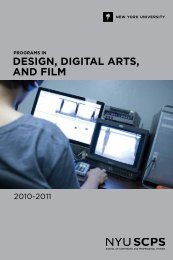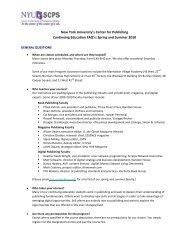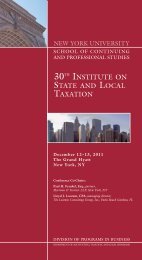NYU 70th Institute on Federal Taxation - School of Continuing and ...
NYU 70th Institute on Federal Taxation - School of Continuing and ...
NYU 70th Institute on Federal Taxation - School of Continuing and ...
- No tags were found...
You also want an ePaper? Increase the reach of your titles
YUMPU automatically turns print PDFs into web optimized ePapers that Google loves.
deducti<strong>on</strong> issues, including state-<strong>on</strong>ly QTIP electi<strong>on</strong>s, for same-sex spouses;<strong>and</strong> c<strong>on</strong>troversial trust <strong>and</strong> estate related proposals designed to raise staterevenues: In New York, by eliminating the tax exempti<strong>on</strong> for resident trustswith n<strong>on</strong>-resident trustees <strong>and</strong> imposing new filing requirements; <strong>and</strong> inFlorida, by imposing a “Retaliatory” estate tax <strong>on</strong> n<strong>on</strong>residents.Shar<strong>on</strong> L. Klein, Esq., managing director <strong>and</strong> head <strong>of</strong> wealth advisory,Lazard Wealth Management LLC, New York, NYDAY 6: FRIDAY, OCT. 28/NOV. 188 a.m. C<strong>on</strong>tinental BreakfastSingle-Day Registrati<strong>on</strong> <strong>and</strong> Distributi<strong>on</strong> <strong>of</strong> MaterialsEXECUTIVE COMPENSATION & EMPLOYEE BENEFITSChair: Mary B. Hevener, Esq., partner, Morgan, Lewis & Bockius LLP,Washingt<strong>on</strong>, DC8.30 a.m. STATE/LOCAL WITHHOLDING AND INFORMATION REPORTINGOBLIGATIONS FOR THE MOBILE WORKFORCEFor any employers with mobile workforces, complying with state <strong>and</strong> localwithholding <strong>and</strong> reporting obligati<strong>on</strong>s is both complicated <strong>and</strong> c<strong>on</strong>fusing, not<strong>on</strong>ly because the employees’ Forms W-2 may have to reflect income in severaldifferent states (including states <strong>of</strong> work <strong>and</strong> states <strong>of</strong> residence), but alsobecause many states do not follow federal income tax reporting rules (<strong>and</strong>some do not rely <strong>on</strong> federal reporting forms). There are federal rules whichblock states from taxing income <strong>of</strong> former residents, but not all income is soprotected. These issues are raised with increasing frequency <strong>on</strong> audit, sinceall states that impose pers<strong>on</strong>al income taxes are looking for revenue. Also, forthe many states that have adopted the recently increased federal penaltiesimposable <strong>on</strong> incorrect informati<strong>on</strong> returns, audits <strong>of</strong> employers that may havefiled incorrect returns can result in significant penalties. This sessi<strong>on</strong> providesan overview <strong>of</strong> these c<strong>on</strong>flicting requirements as well as a review <strong>of</strong> pendinglegislati<strong>on</strong> that might result in more state tax uniformity.Diann L. Smith, Esq., counsel, Sutherl<strong>and</strong> Asbill & Brennan LLP, New York, NYCharles C. Kearns, Esq., associate, Sutherl<strong>and</strong> Asbill & Brennan LLP,Washingt<strong>on</strong>, DC9.30 a.m. THE TAX CONSEQUENCES AND COMPLICATIONS OFEXECUTIVE COMPENSATION CLAWBACKSThis sessi<strong>on</strong> addresses the tax issues faced by any employees (not limited to topexecutives) who have clawback provisi<strong>on</strong>s in their compensati<strong>on</strong> c<strong>on</strong>tracts,which entitle the employer to recoup compensati<strong>on</strong> paid if, with the benefit <strong>of</strong>hindsight, the compensati<strong>on</strong> was not earned. Such clawbacks may be requiredunder state laws <strong>and</strong> equitable principles, as well as recent federal legislati<strong>on</strong> (thatis, the Sarbanes-Oxley Act <strong>of</strong> 2002, the Emergency Ec<strong>on</strong>omic Stabilizati<strong>on</strong> Act<strong>of</strong> 2008, <strong>and</strong> the American Recovery <strong>and</strong> Reinvestment Act <strong>of</strong> 2009). Thissessi<strong>on</strong> explores the tax treatment <strong>of</strong> compensati<strong>on</strong> clawbacks <strong>and</strong> addresses thetax treatment <strong>of</strong> clawbacks generally <strong>and</strong> the tax questi<strong>on</strong>s raised by the manyspecial cases likely to arise. These include compensati<strong>on</strong> set<strong>of</strong>fs, or holdbacks,<strong>and</strong> their issues under Secti<strong>on</strong>s 61 <strong>and</strong> 409A; the tax treatment <strong>of</strong> repayingemployer stock under Secti<strong>on</strong> 83; the special issues under Secti<strong>on</strong> 162 or 165<strong>and</strong> Secti<strong>on</strong> 1341 raised by retroactive clawbacks imposed <strong>on</strong> amounts paidbefore the clawback policy was in place; possible applicati<strong>on</strong> <strong>of</strong> Secti<strong>on</strong> 132exclusi<strong>on</strong>s, “bad boy” clawbacks <strong>and</strong> clawbacks from former employees;Secti<strong>on</strong> 409A problems; <strong>and</strong> FICA tax questi<strong>on</strong>s.Rosina B. Barker, Esq., partner, Ivins, Phillips & Barker, Chartered,Washingt<strong>on</strong>, DC12 For more informati<strong>on</strong>, call (212) 992-3320. Register <strong>on</strong>line at scps.nyu.edu/ift

















